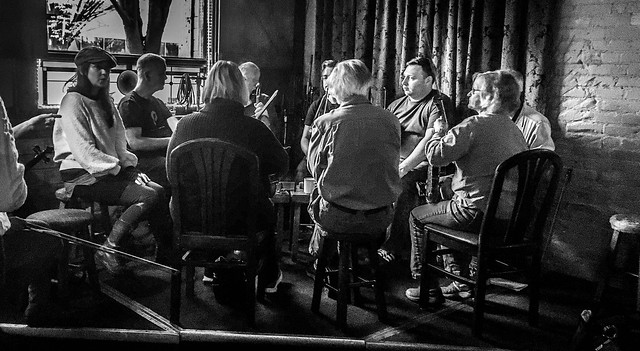First learn, then contribute.
I have been pondering the problems with last Sunday’s Irish music session at Jack of the Wood. Specifically, I’ve been thinking about this in terms of some of the problems I encountered in Washington State. There is an issue specifically with Irish music, but the problems with the last session could happen with just about any non-concert corporate music-making session.
I am a professional musician. I have taught music, worked as a choir director, and even now I get paid to sing. I am a fairly decent keyboard player. I have taken years of piano lessons, played keyboards with bands, and have played organ and piano in church. Music that I have composed and arranged has been performed in concert and in churches. I consider voice and piano my primary instruments.
However, in other settings I am a rank beginner. I’ve only been playing banjo for a few years and guitar realistically less than that. Even with limited skills I love to participate. Any time I go into a session my first goal is to learn as much as I can, then contribute what I can without detracting from what is already there.
I learned this very early on when I started doing shape note singing. I thought I was thoroughly familiar with the Sacred Harp literature. I had done lots of arrangements in concert. I’m well-versed in meter, hymnody, and syllable tones and just about every other aspect of that tradition. But, when I first took my place at the center of the square to lead a song I failed miserably. I tried to “conduct” rather than “lead.” It was a simple matter of not really participating in the tradition and understanding it as well as I thought. It is nothing like choral singing. I had to learn this before I could contribute without messing things up.
Every time I go into a session, whether it’s for the first time or for the hundredth, I try to learn something. It could be a new tune, a new strumming pattern or a new way of chording a song. I gain confidence and feel like I can contribute more.
First learn, then contribute.
Learning isn’t limited to music. It could be that you learn that you don’t belong with that group. You might not yet have the skills to keep up. You might even learn that you just really don’t like these people and would rather not be around them. It happens.
The problem often comes when someone enters a session and feels that they need to prove their worth. I think this is what happened at the Irish session. The new folks didn’t pause to get a feel for the session and learn what goes on before diving right in. Subsequently, other regulars completely stopped playing. Some regulars handled it better than others and some were rather unsubtle about their displeasure that their space had been invaded.
This is the main reason why I visited and observed several weeks prior to joining the session at Jack of the Wood. I made a note of group behavior and possible pitfalls. My plan was to join in on the fringes, then participate more as I got a better feel for the group. Even with the weird circumstances I still tried to do that with my first session with them.
I’ve seen this happen in other settings. Someone new comes in and thinks everyone is having fun the wrong way. They know better. They have to prove their worth. The result can be hostility from the core group. Sometimes that person can take over. I can think of one ukulele group where this happened, and the newcomer wound up dominating subsequent sessions. Really, it can happen in any group gathering, be it music, religion, literature, etc., etc.
For the core group if this happens too many times then you start to see these isolationist tendencies, especially in Irish and traditional mountain music. “Yeah, you can play with us, but we’d rather you not unless you’re an expert in the way we do things.” This can make newcomers feel unwelcome regardless of their intentions.
First learn, then contribute. Always have fun.
If the group isn’t doing things the way you like, you don’t have to come back. Earning the trust and respect of the group takes time, and at that point they may be willing to accept new ideas. However, if you’re not having fun you don’t need to be there. Period. It’s not cool to ruin other people’s fun, but if they can’t have fun with you there, then that’s their problem, not yours.
As I was pondering these things I got an e-mail newsletter from the Littlefield Celtic Center in Mount Vernon. In it they said that they were ending the regular monthly Irish music sessions due to declining participation. That doesn’t surprise me. The attitude I got was that the session was only for seasoned players and that newcomers weren’t really welcome. It’s hard to sustain a group like that. The Scottish sessions, on the other hand, always made me feel welcome and I think I my playing developed most from participation in that group. Same skill levels in each group, but different attitudes. Oh well.
There is no perfect solution. I’ll just keep doing what I’ve been doing. If I feel like I’m not having fun or that I can’t keep up, I don’t have to go back. That applies to just about everything – music session, Chorale, disc golf, whatever. I don’t have to feel guilty about it, either.
